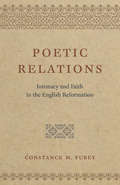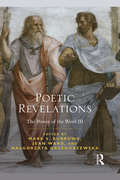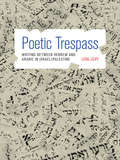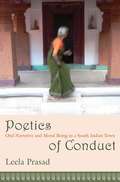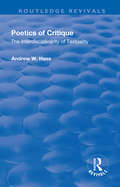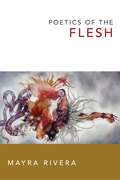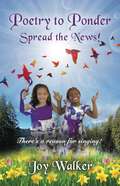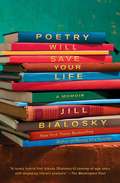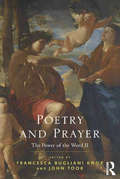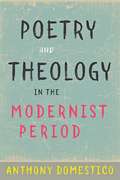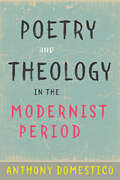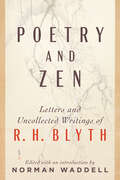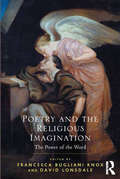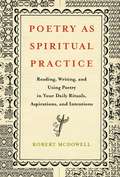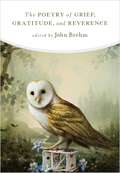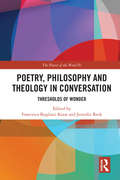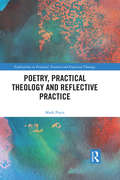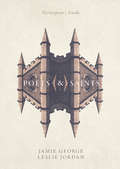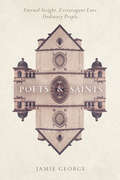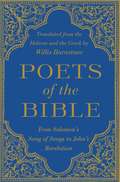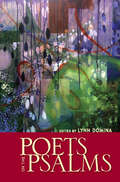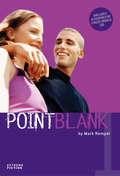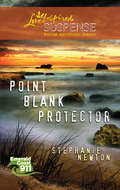- Table View
- List View
Poetic Relations: Intimacy and Faith in the English Reformation
by Constance M. FureyWhat is the relationship between our isolated and our social selves, between aloneness and interconnection? Constance M. Furey probes this question through a suggestive literary tradition: early Protestant poems in which a single speaker describes a solitary search for God. As Furey demonstrates, John Donne, George Herbert, Anne Bradstreet, and others describe inner lives that are surprisingly crowded, teeming with human as well as divine companions. The same early modern writers who bequeathed to us the modern distinction between self and society reveal here a different way of thinking about selfhood altogether. For them, she argues, the self is neither alone nor universally connected, but is forever interactive and dynamically constituted by specific relationships. By means of an analysis equally attentive to theological ideas, social conventions, and poetic form, Furey reveals how poets who understand introspection as a relational act, and poetry itself as a form ideally suited to crafting a relational self, offer us new ways of thinking about selfhood today—and a resource for reimagining both secular and religious ways of being in the world.
Poetic Revelations: Word Made Flesh Made Word: The Power of the Word III (The Power of the Word)
by Mark S. Burrows Jean Ward Małgorzata GrzegorzewskaThis book explores the much debated relation of language and bodily experience (i.e. the 'flesh'), considering in particular how poetry functions as revelatory discourse and thus relates to the formal horizon of theological inquiry. The central thematic focus is around a 'phenomenology of the flesh' as that which connects us with the world, being the site of perception and feeling, joy and suffering, and of life itself in all its vulnerability. <P><P> The voices represented in this collection reflect interdisciplinary methods of interpretation and broadly ecumenical sensibilities, focusing attention on such matters as the revelatory nature of language in general and poetic language in particular, the function of poetry in society, the question of Incarnation and its relation to language and the poetic arts, the kenosis of the Word, and human embodiment in relation to the word 'enfleshed' in poetry.
Poetic Trespass
by Lital LevyA Palestinian-Israeli poet declares a new state whose language, "Homelandic," is a combination of Arabic and Hebrew. A Jewish-Israeli author imagines a "language plague" that infects young Hebrew speakers with old world accents, and sends the narrator in search of his Arabic heritage. In Poetic Trespass, Lital Levy brings together such startling visions to offer the first in-depth study of the relationship between Hebrew and Arabic in the literature and culture of Israel/Palestine. More than that, she presents a captivating portrait of the literary imagination's power to transgress political boundaries and transform ideas about language and belonging. Blending history and literature, Poetic Trespass traces the interwoven life of Arabic and Hebrew in Israel/Palestine from the turn of the twentieth century to the present, exposing the two languages' intimate entanglements in contemporary works of prose, poetry, film, and visual art by both Palestinian and Jewish citizens of Israel. In a context where intense political and social pressures work to identify Jews with Hebrew and Palestinians with Arabic, Levy finds writers who have boldly crossed over this divide to create literature in the language of their "other," as well as writers who bring the two languages into dialogue to rewrite them from within. Exploring such acts of poetic trespass, Levy introduces new readings of canonical and lesser-known authors, including Emile Habiby, Hayyim Nahman Bialik, Anton Shammas, Saul Tchernichowsky, Samir Naqqash, Ronit Matalon, Salman Masalha, A. B. Yehoshua, and Almog Behar. By revealing uncommon visions of what it means to write in Arabic and Hebrew, Poetic Trespass will change the way we understand literature and culture in the shadow of the Israeli-Palestinian conflict.Some images inside the book are unavailable due to digital copyright restrictions.
Poetics of Conduct: Oral Narrative and Moral Being in a South Indian Town
by Leela PrasadLeela Prasad's riveting book presents everyday stories on subjects such as deities, ascetics, cats, and cooking along with stylized, publicly delivered ethical discourse, and shows that the study of oral narrative and performance is essential to ethical inquiry. Prasad builds on more than a decade of her ethnographic research in the famous Hindu pilgrimage town of Sringeri, Karnataka, in southwestern India, where for centuries a vibrant local culture has flourished alongside a tradition of monastic authority. Oral narratives and the seeing-and-doing orientations that are part of everyday life compel the question: How do individuals imagine the normative, and negotiate and express it, when normative sources are many and diverging? Moral persuasiveness, Prasad suggests, is intimately tied to the aesthetics of narration, and imagination plays a vital role in shaping how people create, refute, or relate to "text," "moral authority," and "community." Lived understandings of ethics keep notions of text and practice in flux and raise questions about the constitution of "theory" itself. Prasad's innovative use of ethnography, poetics, philosophy of language, and narrative and performance studies demonstrates how the moral self, with a capacity for artistic expression, is dynamic and gendered, with a historical presence and a political agency.
Poetics of Critique: The Interdisciplinarity of Textuality (Routledge Revivals Ser.)
by Andrew W. HassTitle first published in 2003. Poetics of Critique breaks new ground in its pursuit of a formal and critical language of interdisciplinarity. The "founding" disciplines within the humanities - theology, philosophy, and literature - are brought together here in a shared space, but one that reconstitutes the very nature of each and any discipline. Readings alternate between discursive analysis and imaginative revisioning; texts alternate between those of the critical thinker (Kant, Nietzsche, Gadamer) and those of the novelist, the poet, and the playwright (Bulgakov, Goethe, Kundera, Sophocles). In this movement between traditions, a fusion, at once organic and dynamic, takes place: theologian, philosopher and artist become one, and a pure interdisciplinarity begins to emerge into view. Andrew Hass draws us into a new critical-poetic sensibility, by which we may explore the ultimate questions of human existence and divine reality with new vigor and sustain, or indeed revitalize, our deep passion for the fundamental question of truth.
Poetics of the Flesh
by Mayra RiveraIn Poetics of the Flesh Mayra Rivera offers poetic reflections on how we understand our carnal relationship to the world, at once spiritual, organic, and social. She connects conversations about corporeality in theology, political theory, and continental philosophy to show the relationship between the ways ancient Christian thinkers and modern Western philosophers conceive of the "body" and "flesh." Her readings of the biblical writings of John and Paul as well as the work of Tertullian illustrate how Christian ideas of flesh influenced the works of Maurice Merleau-Ponty and Michel Foucault, and inform her readings of Judith Butler, Frantz Fanon, and others. Rivera also furthers developments in new materialism by exploring the intersections among bodies, material elements, social arrangements, and discourses through body and flesh. By painting a complex picture of bodies, and by developing an account of how the social materializes in flesh, Rivera provides a new way to understand gender and race.
Poetry To Ponder: Spread The News! - There's A Reason For Singing
by Joy WalkerThis retelling of the Christmas story, through poetry and biblical references, inspires thoughtful meditation and joyful singing. Several poems can be sung to the tune of well-known Christmas carols and other songs. Reflections on the reason for Jesus’ birth remind us that we can still have hope for our broken world. The opening theme is the birth of Jesus, a miraculous display of God’s love for us celebrated at Christmas. However, Christmas is only the beginning. What follows His birth is even more astounding and life-transforming. The first part of the book resounds with joy and celebration at this phenomenal love-gift sent to us by a holy and loving God seeking to reconnect with his lost sheep. The celebration is not just because of His birth, but because He was born to die for mankind’s redemption from sin’s bondage. What is more praiseworthy is His resurrection, the foundation of the Christian faith. Because Jesus is alive, His power and light will always outshine the darkness. This is clearly a reason for singing. With the life of Jesus as our example, the remaining poems cover various aspects of Christian living: forgiveness, righteousness, justice, compassion for our neighbor and resisting temptation. Some poems cover controversial issues like the sanctity of life and the sanctity of marriage. They remind us that we are in a spiritual battle and must daily make choices between good and evil. We are exhorted to love God and obey His precepts in order to flourish. Loving and caring for each other are some of the daily choices we must make. Without that, our human society sinks into chaos. While the explosion of evil around us is frightening, we also struggle with our own personal weaknesses and failures and need reminders that Jesus will meet us in those struggles. Several of the poems are prayers from a burdened heart wrestling with the enticement of sin and the need to receive or grant forgiveness. Some are the expressions of grief and pain in moments of despair so common to mankind. Other poems are songs of praise and thanksgiving for God’s faithfulness in delivering from trials of various kinds. The book ends with poems of victory in anticipation of Jesus’ triumphant return to fulfill His promise to abolish sin and suffering. It is a time of rejoicing for those who love Him, but a time of fear and trembling for those who do not. The goal of this book is to point people to the God who sees all and who does not desire anyone to perish. His mercy is extended to all who would receive it. The biblical references that follow the poems will challenge the reader to a deeper dive into the very words of God to glean strength, wisdom and courage for daily living. These poems are meant to serve as a springboard to that end, and there is something here for everyone and for every season.
Poetry Will Save Your Life: A Memoir
by Jill BialoskyAn unconventional and inventive coming-of-age memoir organized around forty-three remarkable poems by poets such as Robert Frost, Emily Dickinson, Wallace Stevens and Sylvia Plath, from a critically acclaimed New York Times bestselling author and poet.For Jill Bialosky, certain poems stand out like signposts at pivotal moments in a life: the death of a father, adolescence, first love, leaving home, the suicide of a sister, marriage, the birth of a child, the day in New York City the Twin Towers fell. As Bialosky narrates these moments, she illuminates the ways in which particular poems offered insight, compassion, and connection, and shows how poetry can be a blueprint for living. In Poetry Will Save Your Life, Bialosky recalls when she encountered each formative poem, and how its importance and meaning evolved over time, allowing new insights and perceptions to emerge. While Bialosky’s personal stories animate each poem, they touch on many universal experiences, from the awkwardness of girlhood, to crises of faith and identity, from braving a new life in a foreign city to enduring the loss of a loved one, from becoming a parent to growing creatively as a poet and artist. In Poetry Will Save Your Life, Bialosky has crafted an engaging and entirely original examination of a life while celebrating the enduring value of poetry, not as a purely cerebral activity, but as a means of conveying personal experience and as a source of comfort and intimacy. In doing so she brilliantly illustrates the ways in which poetry can be an integral part of life itself and can, in fact, save your life.
Poetry and Prayer: The Power of the Word II (The Power of the Word)
by Francesca Bugliani Knox John TookInterdisciplinary and ecumenical in scope, Poetry and Prayer offers theoretical discussion on the profound connection between poetic inspiration and prayer as well as reflection on the work of individual writers and the traditions within which they stand. An international range of established and new scholars in literary studies and theology offer unique contributions to the neglected study of poetry in relation to prayer. Part I addresses the relationship of prayer and poetry. Parts II and III consider these and related ideas from the point of view of their implementation in a range of different authors and traditions, offering case studies from, for example, the Bible, Dante, Shakespeare and Herbert, as well as twentieth-century poets such as Thomas Merton, Denise Levertov, W.H. Auden and R.S. Thomas.
Poetry and Theology in the Modernist Period
by Anthony DomesticoIn this book, Domestico reveals how an important strand of modern poetry actually understood itself in and through the central theological questions of the modernist era: What is transcendence, and how can we think and write about it? What is the sacramental act, and how does its wedding of the immanent and the transcendent inform the poetic act? How can we relate kairos (holy time) to chronos (clock time)? Seeking answers to these complex questions, Domestico examines both modernist institutions (the Criterion) and specific works of modern poetry (Eliot’s Four Quartets and Jones’s The Anathemata). The book also traces the contours of what it dubs "theological modernism": a body of poetry that is both theological and modernist. In doing so, this book offers a new literary history of the modernist period, one that attends both to the material circulation of texts and to the broader intellectual currents of the time.
Poetry and Theology in the Modernist Period
by Anthony DomesticoWhat if the religious themes and allusions in modernist poetry are not just metaphors?Following the religious turn in other disciplines, literary critics have emphasized how modernists like Woolf and Joyce were haunted by Christianity’s cultural traces despite their own lack of belief. In Poetry and Theology in the Modernist Period, Anthony Domestico takes a different tack, arguing that modern poets such as T. S. Eliot, W. H. Auden, and David Jones were interested not just in the aesthetic or social implications of religious experience but also in the philosophically rigorous, dogmatic vision put forward by contemporary theology. These poets took seriously the truth claims of Christian theology: for them, religion involved intellectual and emotional assent, doctrinal articulation, and ritual practice. Domestico reveals how an important strand of modern poetry actually understood itself in and through the central theological questions of the modernist era: What is transcendence, and how can we think and write about it? What is the sacramental act, and how does its wedding of the immanent and the transcendent inform the poetic act? How can we relate kairos (holy time) to chronos (clock time)? Seeking answers to these complex questions, Domestico examines both modernist institutions (the Criterion) and specific works of modern poetry (Eliot’s Four Quartets and Jones’s The Anathemata). The book also traces the contours of what it dubs "theological modernism": a body of poetry that is both theological and modernist. In doing so, this book offers a new literary history of the modernist period, one that attends both to the material circulation of texts and to the broader intellectual currents of the time.
Poetry and Zen: Letters and Uncollected Writings of R. H. Blyth
by R. H. BlythNever before published letters and uncollected short writings of R. H. Blyth, champion of Zen and the person who brought haiku to the world.Poetry and Zen assembles a remarkable literary feast: the letters, articles, translations, reviews, and selections from the papers of Reginald Horace Blyth (1898–1964). Following on the landmark success of Zen in English Literature and Oriental Classics (1942), Blyth&’s voluminous writings on Zen, Japanese culture, and the Japanese verse forms haiku and senryū captured the imagination of English-speaking readers in the decades following World War II. His enlightening wit and inimitable style struck a particularly sensitive chord in the artistic community, providing inspiration to many poets and writers and helping to kindle global interest in Zen and haiku.Blyth&’s penetrating insights on these topics in a series of books published between 1942 and 1970 helped lay the foundation for the remarkable expansion of Zen outside of East Asia, as well as the popularization of haiku as an international verse form that took place after his death. Poetry and Zen is the first collection of Blyth&’s letters and short writings. The generous array of Blyth&‘s literary output and personal writing on display here showcases the wide-ranging interests and brilliant mind of a pivotal figure in the history of modern Zen and Japanese poetry.
Poetry and the Religious Imagination: The Power of the Word (The Power of the Word)
by David Lonsdale Francesca Bugliani KnoxWhat is the role of spiritual experience in poetry? What are the marks of a religious imagination? How close can the secular and the religious be brought together? How do poetic imagination and religious beliefs interact? Exploring such questions through the concept of the religious imagination, this book integrates interdisciplinary research in the area of poetry on the one hand, and theology, philosophy and Christian spirituality on the other. Established theologians, philosophers, literary critics and creative writers explain, by way of contemporary and historical examples, the primary role of the religious imagination in the writing as well as in the reading of poetry.
Poetry as Spiritual Practice
by Robert Mcdowell"[When we read and write poetry,] it is as if a long-settled cloud in our mind suddenly dissipates, and we are divine once again." -- from the Introduction Poetry is the language of devotion in prayer, chant, and song. Reading and writing poetry creates clarity, deepens and expands spiritual inquiry, and cultivates wisdom, compassion, self-confidence, patience, and love. In author Robert McDowell's words, poetry makes you into a tuning fork of the Divine. But poetry has disappeared over the centuries from religious ceremonies, academic curricula, and public discourse. In Poetry as Spiritual Practice, the first inspirational and instructional guide to combine poetry and spirituality, McDowell restores poetry as the natural language of spiritual practice and invites you to recognize poetry as "the pure sound and shape of your spirit." Vividly illustrated with a wide range of poems from all historical eras and poetic traditions, numerous religions and faiths, and McDowell's own and his students' work, Poetry as Spiritual Practice will reintroduce you to the unique pleasure of verse. And meditations throughout will allow you to integrate reading and writing poetry into your spiritual journeys and daily life. Since many of us have long forgotten, or never learned, the mechanics and terminology of poetry -- trochaic feet and tropes trip us up; we can't tell a villanelle from its shorter cousin, rondeau; and a terza rima may as well be a tanka -- this is also an instructional handbook on reading and writing poetry. An engaging guide through the landscape of world poetry, McDowell argues along the way for the many practical benefits of poetic literacy. Making poetry an essential part of daily rituals, aspirations, and intentions will put you on the path to greater meaning, growth, and peace in your life. At once an engaging technical primer, a profound meditation on the relationship between poetry and the Divine, and an inspirational guide for integrating poetry into spiritual practice, Poetry as Spiritual Practice will become a cherished companion.
Poetry of Grief, Gratitude, and Reverence
by John BrehmA new anthology from the editor of the bestselling Poetry of Impermanence, Mindfulness, and Joy.Explorations on a journey through the darkest and brightest moments of our lives, the poems gathered here are explorations of loss, of thanksgiving, of transformation. Some show a path forward and others simply acknowledge and empathize with where we are, but all are celebrations of poetry&’s ability to express what seemed otherwise inexpressible, to touch deep inside our hearts—and also pull ourselves out of our selves and into greater connection with the world around us. Includes poems by Rainer Maria Rilke, Robert Frost, Elizabeth Bishop, Czeslaw Milosz, Seamus Heaney, Billy Collins, Joy Harjo, Danusha Lameris, Ada Limon, Kevin Young, Arthur Sze, Ellen Bass, Li Young-Lee, Natasha Tretheway, and many more. The editor also includes an essay on appreciative attention and links to guided meditations for select poems, offering us a chance to have an even deeper experience of reflection.
Poetry, Philosophy and Theology in Conversation: Thresholds of Wonder: The Power of the Word IV
by Jennifer Reek Francesca Bugliani KnoxThis volume is a collection of essays that explains how literature, philosophy and theology have explored the role of wonder in our lives, particularly through poetry. Wonder has been an object of fascination for these disciplines from the Greek antiquity onwards, yet the connections between their views on the subject are often ignored in subject specific studies. The book is divided into three parts: Part I opens the conversation on wonder in philosophy, Part II is given to theology and Part III to literary perspectives. An international set of contributors, including poets as well as scholars, have produced a study that looks beyond traditional chronological, geographical and disciplinary boundaries, both within the individual essays themselves and in respect to one another. The volume’s wide historical framework is punctuated by four poems by contemporary poets on the theme of wonder. An unconventional foray into one of the best-known themes of the European tradition, this book will be of great interest to scholars of literature, theology and philosophy.
Poetry, Practical Theology and Reflective Practice (Explorations in Practical, Pastoral and Empirical Theology)
by Mark PryceThis groundbreaking study offers an innovative critical analysis of poetry as a resource for reflective practice in the context of continuing professional development. In the contemporary drive in all professions for greater rigour in education, training, and development, little attention is paid to the inner shape of learning and meaning-making for individuals and groups, especially ways in which individuals are formed for the task of their work. Building on empirical research into the author’s professional practice, the book takes the use of poetry in clergy continuing ministerial development as a case-study to examine the value of poetry in professional learning. Setting out the advantages and limitations of poetry as a stimulant for imaginative, critical reflexivity, and formation within professional reflective practice, the study develops a practical model for group reflection around poetry, distilling pedagogical approaches for working effectively with poetry in continuing professional development. Drawing together a number of strands of thinking about poetry, Practical Theology, and reflective practice into a tightly argued study, the book is an important methodological resource. It makes available a range of primary and secondary sources, offering researchers into professional practice a model of ethnographic research in Practical Theology which embraces innovative methods for reflexivity and theological reflection, including the value of auto-ethnographic poetry.
Poets and Saints Participant's Guide
by Leslie Jordan Jamie GeorgeThis immersive seven-week experience uses the intentional conversations of the Poets and Saints DVD as a springboard for further reflection and discussion. Exploring the spiritual lives of Christians such as Saint Francis of Assisi and George MacDonald, and featuring photography and artwork reflective of their lives and experiences, Poets and Saints Participant's Guide challenges readers to grow in their own faith as they immerse themselves in the remarkable lives of those who have gone before them.
Poets and Saints: Eternal Insight. Extravagant Love. Ordinary People.
by Jamie GeorgeOne of the most beautiful ways to know God better is to learn from those who served Him in other times and cultures. The poets and saints of Christian history were imperfect, yet they offer wisdom across the centuries that is as powerful today as it was to their contemporaries. In Poets and Saints, Jamie George takes readers from a pub in Oxford, to a cathedral in the Italian hills, to a rooftop in Switzerland, and beyond as he offers insight into the minds and hearts of Christians such as John Newton, C. S. Lewis, and Saint Therese.
Poets of the Bible: From Solomon's Song of Songs to John's Revelation
by Willis Barnstone“The vividness and beauty of the language emerge in a fresh way . . . with evocative simplicity.” —Robert Alter, professor emeritus of Hebrew and comparative literature, University of California, Berkeley The world’s greatest poetry resides in the Bible, yet these major poets are traditionally rendered into prose. In this pioneering volume of biblical poets translated in English, Willis Barnstone restores the lyricism and power of the poets’ voices in both the New and Old Testaments. In the Hebrew Bible we hear Solomon rhapsodize in Song of Songs, David chant in Psalms, God and Job debate in grand rhetoric, and prophet poet Isaiah plead for peace. Jesus speaks in wisdom verse in the Gospel, Paul is a philosopher of love, and John of Patmos roars majestically in Revelation, the Bible’s epic poem. This groundbreaking volume includes every major biblical poem from Genesis and Adam and Eve in the Garden to the last pages of Alpha and Omega in Paradise.
Poets on the Psalms
by Lynn DominaReverential, celebratory, antagonistic, and even erotic, this remarkable collection of essays interprets the Psalms as a collection of poetry. Written by 14 acclaimed poets, the essays approach the Psalms from a personal, often autobiographical perspective, demonstrating how relevant they remain for today's readers. Alicia Ostriker examines the Psalms' glory and their terror in a moving essay that revels in their moods of joy while acknowledging the brutality they invoke, linking their violence to events such as 9/11, the Palestinian uprisings, and the Rwandan massacres. Weaving autobiographical anecdotes with scholarly introspection, Enid Dame provides a Jewish explanation of Psalm 22, while editor Lynn Domina contemplates the pastoral life as she connects the everyday with phrases from the Psalms. From a former nun to a self-described left-wing Jew, from a Midrashic scholar to a Texas rancher, the contributors mirror the wide swath of humanity interested in, and affected by, the Psalms.
Poets on the Psalms
by Lynn DominaReverential, celebratory, antagonistic, and even erotic, this remarkable collection of essays interprets the Psalms as a collection of poetry. Written by 14 acclaimed poets, the essays approach the Psalms from a personal, often autobiographical perspective, demonstrating how relevant they remain for today's readers. Alicia Ostriker examines the Psalms' glory and their terror in a moving essay that revels in their moods of joy while acknowledging the brutality they invoke, linking their violence to events such as 9/11, the Palestinian uprisings, and the Rwandan massacres. Weaving autobiographical anecdotes with scholarly introspection, Enid Dame provides a Jewish explanation of Psalm 22, while editor Lynn Domina contemplates the pastoral life as she connects the everyday with phrases from the Psalms. From a former nun to a self-described left-wing Jew, from a Midrashic scholar to a Texas rancher, the contributors mirror the wide swath of humanity interested in, and affected by, the Psalms.
Point Blank
by Mark A. RempelAll Seth Anderson wanted to do was to graduate. Point Blank takes us into the final weeks of his senior year as Seth finishes his last assignment-a project for his philosophy class exploring the question, "What is the meaning of life?" Suddenly Seth finds himself in the middle of the worst school shooting in the history of America and forced to find meaning for his own life, while staring point blank at the barrel of a gun. What would you say if a gun was pointed at your head, Point Blank?
Point Blank
by Mark RempelAll Seth Anderson wanted to do was to graduate. Point Blank takes us into the final weeks of his senior year as Seth finishes his last assignment-a project for his philosophy class exploring the question, "What is the meaning of life?" Suddenly Seth finds himself in the middle of the worst school shooting in the history of America and forced to find meaning for his own life, while staring point blank at the barrel of a gun. What would you say if a gun was pointed at your head, Point Blank?
Point Blank Protector
by Stephanie NewtonWith his cover blown, former DEA Agent Tyler Clark has nothing but time on his hands. Time-and orders-to see the police psychologist before taking a new case. Gracie VanDoren's cheerful determination to help him drives Tyler up the wall. . . ;right up until a threatening letter has Gracie's sunshiny demeanor giving way to fear. As the threats escalate, both realize someone has an unusually personal vendetta against Gracie. Now Tyler's cover is blown again. Because he's committed to being her point-blank protector-even if it means exposing his heart.
